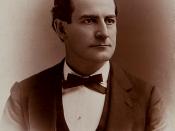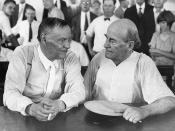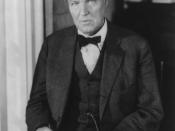An era was coming to an end, and a new one was beginning. America was changing, and socialism was taking its hold. The 1920's social life was split mostly between traditionalists and modernists. Traditionalists believed everything with value was coming to an end, and the behavior of the modernists began to fall upon one's intellect, instead of society's approval. Jazz flowed through the veins of the young as fluently as did alcohol. Prohibition was questioned, contemporary art was abstract, as was the thoughts of the young(Hanson, Linder).
They argued mainstream concepts, and searched for new ideas. One such person was John Thomas Scopes, a high school science teacher who was substituting for a biology teacher in Dayton, Tennessee(Hanson, Linder, Menton). He assigned readings on evolution for a review. Wanting to get publicity for their town, a group of conspirators, including George Rappaylea, a friend of Scopes, concocted a lynching lawsuit against him.
Rappaylea fed words to Scopes to create an image of criminal act by Scopes' teaching of evolution. His teaching came from the state approved textbook, that Scopes had assigned work from. Thus, Scopes had broken the law. Scopes was taken to court, and the trial of the 20's had begun. At court Scopes was tried(Hanson, Linder).
Originally, Rappaylea wanted to have science fiction writer H.G. Wells to head the defense. Wells had no interest in the case, but a law school dean from Knoxville, John Neal, volunteered. Willeam Jennings Bryan, accompanied by Clarence Darrow, offered to join the prosecution team, despite the fact he had not practiced law in over thirty years. Dudley Field Malone, an international divorce attorney, took up the last spot of the defense team. The rest of the prosecution team consisted of A. T. Stewart, Ben B. McKenzie, and Bryan's son William Jennings...


